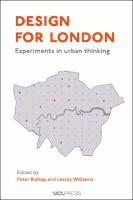Design for London
Experiments in urban thinking
Contributor(s)
Bishop, Peter (editor)
Williams, Lesley (editor)
Language
EnglishAbstract
Design for London was a unique experiment in urban planning, design and strategic thinking. Set up in 2006 by Mayor Ken Livingstone and his Architectural Advisor, Richard Rogers, the brief for the team was ‘to think about London, what made London unique and how it could be made better’. Sitting within London government but outside its formal statutory responsibilities, it was given freedom to question and challenge. The team had no power or money, but it did have the licence to operate without the usual constraints of government. With introductions from Ken Livingstone and Richard Rogers, Design for London covers the tumultuous and heady period of the first decade of this century when London was a test bed for new ideas. It outlines how key projects such as the London Olympics, public space programmes, high street regeneration and greening programmes were managed, critically examines the lessons that might be learnt in strategic urban design and considers how a design agenda for London could be developed in the future. By providing an engaging account of the strategic approaches and work of Design for London, and documenting the particular methodology and approach to urban theory it developed, Design for London will appeal to undergraduate and postgraduate students of planning, urban design and architecture, and to current practitioners from the public, private and community sectors who are struggling to achieve regeneration through poorly understood ‘placemaking’ concepts.
Keywords
London; design; urban planning; Richard Rogers; Ken Livingstone; public space; Olympics 2012; high street regeneration; greening programmes; urban studies; architecture; built environmentDOI
10.14324/111.9781787358942ISBN
9781787358942, 9781787358959, 9781787358966, 9781787358973, 9781787358980, 9781787358942Publisher
UCL PressPublisher website
https://www.uclpress.co.uk/Publication date and place
London, 2020Imprint
UCL PressClassification
Architecture: professional practice
City and town planning: architectural aspects


 Download
Download